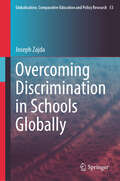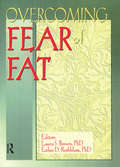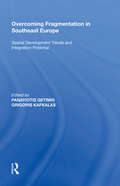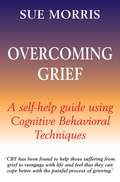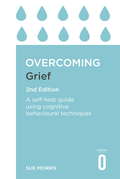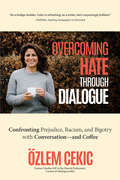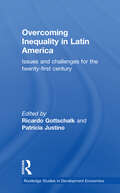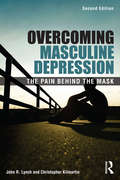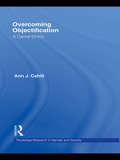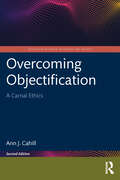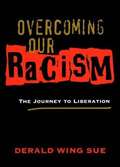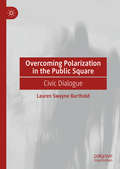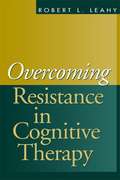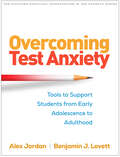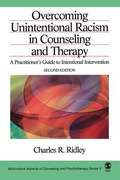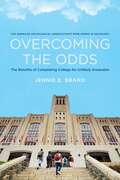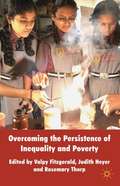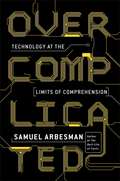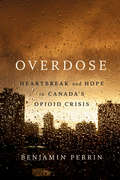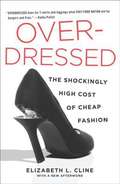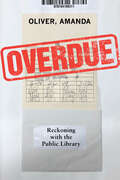- Table View
- List View
Overcoming Discrimination in Schools Globally (Globalisation, Comparative Education and Policy Research #53)
by Joseph ZajdaThis book focuses on global research findings dealing with various forms of visible discrimination in the classroom. The synthesis of research evidence suggests that intelligence discrimination, race and ethnicity discrimination, social class discrimination, labeling students according to their academic achievement, and the self-fulfilling prophecy (SFP) have a powerful impact on students’ self-esteem, engagement, motivation and their academic achievement. Research findings also demonstrate a positive correlation between teachers’ perception of their students’ abilities and students’ actual performance in the classroom. The book analyses and critiques recent research findings dealing with major forms of discrimination in schools, discriminatory practices, their impact on students, and implications for the student’s social identity, self-esteem, and academic achievement. Finally, the book offers relevant and valid strategies for overcoming unacceptable levels of discrimination in schools. This book serves as a sourcebook of ideas for researchers, educators, practitioners and policy makers specializing in the areas of globalisation, performance culture, and discrimination in schools. It offers an overview of education policy reforms and strategies for eliminating discrimination in schools and enhancing authentic education reforms, designed to provide the equality, quality of education for all.
Overcoming Fear of Fat
by Laura Brown Esther D RothblumHere is an enlightening new volume that presents an integration of anti-fat-oppressive attitudes into the work of feminist therapy. Overcoming Fear of Fat is unique among professional work in the area of women and fat in that it does not approach size as the problem; rather it approaches prejudice against fat as the problem. Although for nearly a decade, fat activists have been raising the issues that are confronted in this book, therapists, including feminist therapists, have been colluding with their clients in pathologizing fat, celebrating weight loss, and failing to adequately challenge cultural stereotypes of attractiveness for women, instead of empowering clients and encouraging them to take on expert authority about their own experiences. The contributors, including therapists and fat activists, aim to disconnect the issues of food intake and eating disorders from those of weight. They share personal and professional experiences of challenging fat oppression, offer strategies for therapists to rid themselves and their clients of fat oppressive attitudes, and most importantly, they confront long-held cultural myths that fat is unhealthy, and that fat women are physically unfit and are in hiding from their sexuality or personal power. A practical and informative resource for therapists, especially those who work with fat women or who themselves struggle with issues of feeling critical of their own body size, Overcoming Fear of Fat will also be a valuable guide for fat women who wish to feel supported in their struggle for self-worth and respect.
Overcoming Fragmentation in Southeast Europe: Spatial Development Trends and Integration Potential (Urban And Regional Planning And Development Ser.)
by Panayiotis GetimisWith the expansion of the European Union, the countries of Southeast Europe have finally been brought together within one socio-political entity. The restructuring of these economies following globalization and neoliberalization has meant that this region has become much more open to geopolitical shifts and trends. While the various countries have all entered into the slow process of European integration, the historic fragmentation of this region has led to various conflicts and contradictions in the restructuring and transition of national economies. This volume provides a theoretical and comparative overview which examines the prospects for spatial cohesion in this region. With the need to handle persisting problems and conflicts from the past while coping with new economic and political structures, Southeast Europe proves to be a challenging yet fruitful testing ground for how best to overcome fragmentation and establish a long-term process of social and economic integration.
Overcoming Grief 2nd Edition: A Self-Help Guide Using Cognitive Behavioural Techniques
by Sue MorrisGrief is a natural and healthy reaction to loss but it can be extremely debilitating and result in a downward emotional spiral, impacting on such aspects of life as relationships and work. Relentless grief can cause a host of physical problems due to the sufferer not looking after themselves properly, for example not eating, becoming over-reliant on alcohol, experiencing disrupted sleep. It can also lead to serious emotional and psychological problems such as depression, anxiety, health anxiety and panic attacks. This self-help book will prove invaluable to the recently bereaved, guiding them through the painful process of bereavement. Topics covered: Dealing with expected or unexpected deathChallenging unhelpful thoughtsEstablishing a routine and tackling avoidanceReturning to workPractical aspects such as dealing with the funeral, birthdays, etc.Planning a new future
Overcoming Grief 2nd Edition: A Self-Help Guide Using Cognitive Behavioural Techniques
by Sue MorrisReassuring and helpful strategies to guide you through your griefGrief is a natural reaction to loss, but in some cases it can be devastating, causing a loss of direction which can impact our relationships and work.This practical guide will help you to regain a sense of control and offers tried and tested strategies for adjusting to life without your spouse, friend or family member. Relentless grief can cause a host of physical problems, including difficulties eating, disrupted sleep and becoming over-reliant on alcohol. It can also lead to serious emotional and psychological problems such as depression, anxiety, panic attacks and complicated grief. But techniques from cognitive behavioural therapy (CBT) can help.This self-help book covers:· Coping with the unexpected or long-anticipated death of a loved one· Establishing a routine and tackling avoidance of difficult issues· Practical concerns such as making decisions and dealing with birthdays and anniversaries· Returning to work and planning a new future OVERCOMING self-help guides use clinically-proven techniques to treat long-standing and disabling conditions, both psychological and physical. Many guides in the Overcoming series are recommended under the Reading Well Books on Prescription scheme.Series Editor: Professor Peter Cooper
Overcoming Grief: A Self-Help Guide Using Cognitive Behavioural Techniques (Overcoming Ser.)
by Sue MorrisReassuring and helpful strategies to guide you through your griefGrief is a natural reaction to loss, but in some cases it can be devastating, causing a loss of direction which can impact our relationships and work.This practical guide will help you to regain a sense of control and offers tried and tested strategies for adjusting to life without your spouse, friend or family member. Relentless grief can cause a host of physical problems, including difficulties eating, disrupted sleep and becoming over-reliant on alcohol. It can also lead to serious emotional and psychological problems such as depression, anxiety, panic attacks and complicated grief. But techniques from cognitive behavioural therapy (CBT) can help.This self-help book covers:· Coping with the unexpected or long-anticipated death of a loved one· Establishing a routine and tackling avoidance of difficult issues· Practical concerns such as making decisions and dealing with birthdays and anniversaries· Returning to work and planning a new future OVERCOMING self-help guides use clinically-proven techniques to treat long-standing and disabling conditions, both psychological and physical. Many guides in the Overcoming series are recommended under the Reading Well Books on Prescription scheme.Series Editor: Professor Peter Cooper
Overcoming Hate through Dialogue: Confronting Prejudice, Racism, and Bigotry with Conversation—and Coffee
by Özlem CekicA TED Talk speaker offers a blueprint for confronting racism, prejudice and hatred, a conflict resolution process that she calls &“Dialogue Coffee.&” Familiarity and dialogue are the antidote to intolerance and prejudice. Özlem&’s method of having coffee with people who send her hate mail has been recognized around the world and inspires listening, understanding, and an end to blind hatred. When Özlem Cekic became the first Muslim MP in the Danish Parliament, her email inbox started flooding with hate mail and threats, and her first reaction was to delete and ignore each abusive message. But eventually, she decided to take a risk. She started replying to each message and inviting the senders to meet and engage in dialogue over coffee. What she discovered was that she could create change in the people who sent her hate mail, understand where their anger came from, and build friendships through finding common ground. Imagine a world where we can have a conversation with anyone. Overcoming Hate through Dialogue teaches you how to make that a reality: · Listen and focus on what you have in common instead of your differences · Praise your counterpart for having the courage to have this conversation · Recognize the other person&’s emotions and feelings even if you don&’t agree with them · Distance yourself from the other person&’s attitude, but never the human and their humanity &“This brilliant and well-researched book ought to be required reading for anyone interested in conflict resolution; it gives nuance to an otherwise stale-mated debate.&” —Journalisten &“As a bridge-builder, Cekic is refreshing; as a writer, she&’s surprisingly brilliant.&” —Politiken
Overcoming Inequality in Latin America: Issues and Challenges for the 21st Century (Routledge Studies in Development Economics)
by Ricardo Gottschalk Patricia JustinoLatin America is faced with the challenge of achieving the Millennium Developmental Goal to halve poverty in the region by 2015. Historically, this region has experienced persistently high levels of inequality and poverty, the causes and consequences of which are analytically examined here. Adopting a multidimensional approach, this informative book focuses on the mechanisms that lead to higher inequality and emphasizes the role of macroeconomics, trade rules, capital flows and the political electoral process. It analyzes how inequality has hindered development, how it interacts with a nation’s economic, social and political processes, and how inequality constrains these processes in ways that weakens the prospect of establishing and sustaining a dynamic, wealthy and creative society. An international team of specialist contributors investigate and explain these crucial issues. Examining the key economic policies and reforms which have exacerbated the region’s extremely high inequality levels, throughout this book they prescribe an alternative range of policy suggestions to help alleviate inequality and provide the foundations for more equitable development.
Overcoming Masculine Depression: The Pain Behind the Mask
by John Lynch John R. Lynch Christopher KilmartinIn Overcoming Masculine Depression, psychologists John Lynch and Christopher Kilmartin present a model that provides new ways of understanding men’s behaviors. This unique book does not portray men as victims, but seeks to increase awareness that a great deal of depression in men is misunderstood and quite often misdiagnosed. Many men "act out" their symptoms through anger, workaholism, and relationship conflict. Underlying these behaviors are chronic feelings of being hopeless, helpless, and worthless. Men can learn to recognize symptoms of masculine depression and take steps to reclaim their lives and relationships, and the authors offer many strategies for doing so. Numerous case examples are provided to illustrate the various dynamics of male depression. New to this edition are chapters on self-regulation and impulse control and the application of evidence-based treatment for depression to the symptoms of male depression. This is an essential resource for all helping professionals who work with male clients, as well as for men experiencing symptoms of depression and the people in their lives.
Overcoming Objectification: A Carnal Ethics (Routledge Research in Gender and Society)
by Ann J. CahillObjectification is a foundational concept in feminist theory, used to analyze such disparate social phenomena as sex work, representation of women's bodies, and sexual harassment. However, there has been an increasing trend among scholars of rejecting and re-evaluating the philosophical assumptions which underpin it. In this work, Cahill suggests an abandonment of the notion of objectification, on the basis of its dependence on a Kantian ideal of personhood. Such an ideal fails to recognize sufficiently the role the body plays in personhood, and thus results in an implicit vilification of the body and sexuality. The problem with the phenomena associated with objectification is not that they render women objects, and therefore not-persons, but rather that they construct feminine subjectivity and sexuality as wholly derivative of masculine subjectivity and sexuality. Women, in other words, are not objectified as much as they are derivatized, turned into a mere reflection or projection of the other. Cahill argues for an ethics of materiality based upon a recognition of difference, thus working toward an ethics of sexuality that is decidedly and simultaneously incarnate and intersubjective.
Overcoming Objectification: A Carnal Ethics (Routledge Research in Gender and Society)
by Ann J. CahillThe second edition of Overcoming Objectification: A Carnal Ethics provides a critical analysis of the widely used (particularly in feminist philosophy) concept of objectification, and offers a new concept (derivatization) in its stead.Cahill suggests an abandonment of objectification due to the concept’s dependence on a Kantian ideal of personhood, an ideal that fails to recognize sufficiently the role the body plays in personhood and results in an implicit vilification of the body and sexuality. Phenomena associated with objectification are ethically problematic not because they render women objects, and therefore not-persons, but rather because they construct feminine subjectivity and sexuality as wholly derivative of masculine subjectivity and sexuality. Women are not objectified as much as they are derivatized: turned into a mere reflection or projection of the other. Cahill argues for a sexual ethics grounded in difference, carnality, and intersubjectivity. The preface to the second edition traces new scholarly contributions to conversations regarding sexual ethics, feminist engagements with Kant, intersectionality, and trans philosophy.With original and far-reaching insights regarding the structure of gender inequality, this work will be of interest to students and scholars in the humanities and social sciences alike and will be of particular use to those interested in sexual ethics, sexual assault, and dominant media representations of gendered bodies.
Overcoming Our Racism: The Journey to Liberation
by Derald Wing SueThis uncompromising anti-racist manifesto written for a white audience is concerned less with Klansmen and skinheads than with the white woman clutching her purse when minority teenagers draw near; the white man flinching at getting in an elevator full of black men; even the well-meaning but patronizing liberal teacher in a ghetto school. Sue, a Chinese-American psychologist, argues that the countless daily slights inflicted by such "unconscious and unintentional racists," do more harm to minorities than the occasional hate-crime. He reveals the subtle but pervasive bias against minorities in the economy, the media, school system, even the subconscious mind (whites have involuntary negative reactions when flashed subliminal images of black faces), and shows how the "invisible whiteness of being" allows whites to remain oblivious to the privileges they enjoy. The book demands that whites "accept responsibility for their whiteness," and includes suggested readings, videotapes, and exercises to help whites unearth and deal with their biases and learn to mingle with minorities. It includes a seven-phase program for reconstructing a non-racist white identity, culminating in a conversion experience, complete with emotional catharsis and adoption of a "second family" of minorities and other "liberated whites." Whites may bridle at Sue's accusatory tone and find the recovery-movement tone of his remedy off-putting. But many will feel a painful shock of recognition at his subtle but unsparing analysis of everyday racism, and find this provocative book a compelling challenge to their complacency. Copyright 2003 Reed Business Information, Inc.
Overcoming Polarization in the Public Square: Civic Dialogue
by Lauren Swayne BartholdThis book describes how civic dialogue can serve as an antidote to a polarized public square. It argues that when pervasive polarization renders rational and fact-based argumentation ineffective, we first need to engage in a way that builds trust. Civic dialogue is a form of structured discourse that utilizes first-person narratives in order to promote trust, openness, and mutual understanding. By creating a dialogic structure that encourages listening and reflection, particularities and differences about fraught identities can be expressed in such a way that leads to the possibility of connecting through our fundamental, shared, and deeply felt humanity. Drawing on Plato, Buber, Gadamer, Dewey, cognitive bias research, as well as the work of dialogue practitioners, Lauren Swayne Barthold provides a sustained defense of civic dialogue as an effective strategy for avoiding futile political arguments and for creating pluralistic democratic communities.
Overcoming Resistance in Cognitive Therapy
by Robert L. LeahyDespite the efforts of therapists and patients, many patients in cognitive-behavioral therapy or any therapy do not improve. This unique book is designed to help the clinician better understand and work with patients who seem unable or unwilling to make needed changes. Integrating ideas from a range of psychotherapeutic approaches, the book presents a multidimensional model of resistance. It enumerates the specific impediments to change that may arise in the cognitive therapy context and brings each one to life with realistic clinical illustrations. Clinicians learn practical strategies and interventions to deal with a number of types of resistance, from reluctance to comply with basic cognitive procedures to risk-aversion and self-handicapping. Also addressed are countertransference issues, including workable ways that clinicians can modify their own responses to patients to overcome impasses in treatment.
Overcoming Test Anxiety: Tools to Support Students from Early Adolescence to Adulthood (The Guilford Practical Intervention in the Schools Series)
by Benjamin J. Lovett Alex JordanThis state-of-the-art resource offers school and clinical professionals a comprehensive approach to addressing test anxiety in students from sixth grade through college and beyond (ages 11 to adulthood). The book uniquely combines acceptance-based behavior therapy interventions with practical strategies for improving study skills and enhancing test performance. By learning to disengage from unhealthy worries, students can decrease avoidance and unlock their academic potential. In a convenient large-size format, the book features sample dialogues and scripts, concrete test-taking guidance, and 27 reproducible handouts that can be downloaded and printed. This book is in The Guilford Practical Intervention in the Schools Series, edited by Sandra M. Chafouleas.
Overcoming Unintentional Racism in Counseling and Therapy: A Practitioner's Guide to Intentional Intervention
by Charles R. RidleyDiscusses how individuals can learn how to confront their racist attitudes and become allies.
Overcoming the Odds: The Benefits of Completing College for Unlikely Graduates (American Sociological Association's Rose Series)
by Jennie E. BrandEach year, millions of high school students consider whether to continue their schooling and attend and complete college. Despite evidence showing that a college degree yields far-reaching benefits, critics of higher education increasingly argue that college “does not pay off” and some students - namely, disadvantaged prospective college goers - would be better served by forgoing higher education. But debates about the value of college often fail to carefully consider what is required to speak knowledgeably about the benefits –what a person’s life might look like had they not completed college, or their college counterfactual. In Overcoming the Odds sociologist Jennie E. Brand reveals the benefits of completing college by comparing life outcomes of college graduates with their college counterfactuals. Drawing on two cohorts of nationally representative data from the Bureau of Labor Statistics National Longitudinal Surveys program, Brand uses matching and machine learning methods to estimate the effects of college completion across students with varying likelihoods of completing four-year degrees. To illustrate her findings, Brand describes outcomes using matched vignettes of college and non-college graduates. Brand shows that four-year college completion enables graduates to increase wages and household income, while also circumventing unemployment, low-wage work, job instability, poverty, and social assistance. Completing college also increases civic engagement. Most of these benefits are larger for disadvantaged than for more advantaged students, rendering arguments that college has limited benefits for unlikely graduates as flawed. Brand concludes that greater long-term earnings, and less job instability and unemployment, and thus more tax revenue, less reliance on public assistance, and high levels of volunteering indicate that public investment in higher education for students from disadvantaged backgrounds yields far-reaching collective benefits. She asserts that it is better for our society when more people complete college. Overcoming the Odds is an innovative and enlightening exploration of how college can transform lives.
Overcoming the Persistence of Inequality and Poverty
by Rosemary Thorp Valpy Fitzgerald Judith HeyerInternational experts evaluate new policy directions in economic development and poverty reduction, building on the ideas of a pioneer in the new discipline of Development Studies, Frances Stewart. Combing ideas and evidence on technological change, human development and conflict prevention to address the issue of the persistence of inequality
Overcomplicated: Technology at the Limits of Comprehension
by Samuel ArbesmanWhy did the New York Stock Exchange suspend trading without warning on July 8, 2015? Why did certain Toyota vehicles accelerate uncontrollably against the will of their drivers? Why does the programming inside our airplanes occasionally surprise its creators? After a thorough analysis by the top experts, the answers still elude us. You don't understand the software running your car or your iPhone. But here's a secret: neither do the geniuses at Apple or the Ph.D.'s at Toyota--not perfectly, anyway. No one, not lawyers, doctors, accountants, or policy makers, fully grasps the rules governing your tax return, your retirement account, or your hospital's medical machinery. The same technological advances that have simplified our lives have made the systems governing our lives incomprehensible, unpredictable, and overcomplicated. In Overcomplicated, complexity scientist Samuel Arbesman offers a fresh, insightful field guide to living with complex technologies that defy human comprehension. As technology grows more complex, Arbesman argues, its behavior mimics the vagaries of the natural world more than it conforms to a mathematical model. If we are to survive and thrive in this new age, we must abandon our need for governing principles and rules and accept the chaos. By embracing and observing the freak accidents and flukes that disrupt our lives, we can gain valuable clues about how our algorithms really work. What's more, we will become better thinkers, scientists, and innovators as a result. Lucid and energizing, this book is a vital new analysis of the world heralded as "modern" for anyone who wants to live wisely.
Overcomplicated: Technology at the Limits of Comprehension
by Samuel ArbesmanWhy did the New York Stock Exchange suspend trading without warning on July 8, 2015? Why did certain Toyota vehicles accelerate uncontrollably against the will of their drivers? Why does the programming inside our airplanes occasionally surprise its creators? After a thorough analysis by the top experts, the answers still elude us. You don’t understand the software running your car or your iPhone. But here’s a secret: neither do the geniuses at Apple or the Ph.D.’s at Toyota—not perfectly, anyway. No one, not lawyers, doctors, accountants, or policy makers, fully grasps the rules governing your tax return, your retirement account, or your hospital’s medical machinery. The same technological advances that have simplified our lives have made the systems governing our lives incomprehensible, unpredictable, and overcomplicated. In Overcomplicated, complexity scientist Samuel Arbesman offers a fresh, insightful field guide to living with complex technologies that defy human comprehension. As technology grows more complex, Arbesman argues, its behavior mimics the vagaries of the natural world more than it conforms to a mathematical model. If we are to survive and thrive in this new age, we must abandon our need for governing principles and rules and accept the chaos. By embracing and observing the freak accidents and flukes that disrupt our lives, we can gain valuable clues about how our algorithms really work. What’s more, we will become better thinkers, scientists, and innovators as a result. Lucid and energizing, this book is a vital new analysis of the world heralded as "modern" for anyone who wants to live wisely.
Overcomplicated: Technology at the Limits of Comprehension
by Samuel ArbesmanWhy did the New York Stock Exchange suspend trading without warning on July 8, 2015? Why did certain Toyota vehicles accelerate uncontrollably against the will of their drivers? Why does the programming inside our airplanes occasionally surprise its creators? After a thorough analysis by the top experts, the answers still elude us. You don't understand the software running your car or your iPhone. But here's a secret: neither do the geniuses at Apple or the Ph.D.'s at Toyota--not perfectly, anyway. No one, not lawyers, doctors, accountants, or policy makers, fully grasps the rules governing your tax return, your retirement account, or your hospital's medical machinery. The same technological advances that have simplified our lives have made the systems governing our lives incomprehensible, unpredictable, and overcomplicated. In Overcomplicated, complexity scientist Samuel Arbesman offers a fresh, insightful field guide to living with complex technologies that defy human comprehension. As technology grows more complex, Arbesman argues, its behavior mimics the vagaries of the natural world more than it conforms to a mathematical model. If we are to survive and thrive in this new age, we must abandon our need for governing principles and rules and accept the chaos. By embracing and observing the freak accidents and flukes that disrupt our lives, we can gain valuable clues about how our algorithms really work. What's more, we will become better thinkers, scientists, and innovators as a result. Lucid and energizing, this book is a vital new analysis of the world heralded as "modern" for anyone who wants to live wisely. From the Hardcover edition.
Overdose: Heartbreak and Hope in Canada's Opioid Crisis
by Benjamin Perrin&“Overdose is a necessary and searching investigation into a devastating epidemic that should never have happened. Benjamin Perrin painstakingly shows that it need not continue if we, as a society, heed the evidence.&”—Gabor Maté M.D., author of In The Realm of Hungry Ghosts: Close Encounters With AddictionAn astonishing and powerful look at the ongoing opioid crisis North America is in the middle of a health emergency. Life expectancies are declining. Someone is dying every two hours in Canada from illicit drug overdose. Fentanyl has become a looming presence—an opioid more powerful, pervasive, and deadly than any previous street drug. The victims are many—and often not whom we might expect. They include the poor and forgotten but also our neighbours: professionals, students, and parents. Despite the thousands of deaths, these victims have remained largely invisible. But not anymore. Benjamin Perrin, a law and policy expert, shines a light in this darkest of corners—and his findings challenge many assumptions about the crisis. Why do people use drugs despite the risk of overdosing? Can we crack down on the fentanyl supply? Do supervised consumption sites and providing &“safe drugs&” enable the problem? Which treatments work? Would decriminalizing all drugs help or do further harm? In this urgent and humane look at a devastating epidemic, Perrin draws on behind-the-scenes interviews with those on the frontlines, including undercover police officers, intelligence analysts, border agents, prosecutors, healthcare professionals, Indigenous organizations, activists, and people who use drugs. Not only does he unveil the many complexities of this situation, but he also offers a new way forward—one that may save thousands of lives.
Overdressed
by Elizabeth L. Cline"Overdressed does for T-shirts and leggings what Fast Food Nation did for burgers and fries. ” -Katha Pollitt Cheap fashion has fundamentally changed the way most Americans dress. Stores ranging from discounters like Target to traditional chains like JCPenny now offer the newest trends at unprecedentedly low prices. And we have little reason to keep wearing and repairing the clothes we already own when styles change so fast and it’s cheaper to just buy more. Cline sets out to uncover the true nature of the cheap fashion juggernaut. What are we doing with all these cheap clothes? And more important, what are they doing to us, our society, our environment, and our economic well-being? .
Overdressed: The Shockingly High Cost of Cheap Fashion
by Elizabeth L. ClineUntil recently, Elizabeth Cline was a typical American consumer. She'd grown accustomed to shopping at outlet malls, discount stores like T.J. Maxx, and cheap but trendy retailers like Forever 21, Target, and H&M. She was buying a new item of clothing almost every week (the national average is sixty-four per year) but all she had to show for it was a closet and countless storage bins packed full of low-quality fads she barely wore--including the same sailor-stripe tops and fleece hoodies as a million other shoppers. When she found herself lugging home seven pairs of identical canvas flats from Kmart (a steal at $7 per pair, marked down from $15!), she realized that something was deeply wrong. Cheap fashion has fundamentally changed the way most Americans dress. Stores ranging from discounters like Target to traditional chains like JCPenney now offer the newest trends at unprecedentedly low prices. Retailers are producing clothes at enormous volumes in order to drive prices down and profits up, and they've turned clothing into a disposable good. After all, we have little reason to keep wearing and repairing the clothes we already own when styles change so fast and it's cheaper to just buy more. But what are we doing with all these cheap clothes? And more important, what are they doing to us, our society, our environment, and our economic well-being? In Overdressed, Cline sets out to uncover the true nature of the cheap fashion juggernaut, tracing the rise of budget clothing chains, the death of middle-market and independent retailers, and the roots of our obsession with deals and steals. She travels to cheap-chic factories in China, follows the fashion industry as it chases even lower costs into Bangladesh, and looks at the impact (both here and abroad) of America's drastic increase in imports. She even explores how cheap fashion harms the charity thrift shops and textile recyclers where our masses of clothing castoffs end up.Sewing, once a life skill for American women and a pathway from poverty to the middle class for workers, is now a dead-end sweatshop job. The pressures of cheap have forced retailers to drastically reduce detail and craftsmanship, making the clothes we wear more and more uniform, basic, and low quality. Creative independent designers struggle to produce good and sustainable clothes at affordable prices.Cline shows how consumers can break the buy-and-toss cycle by supporting innovative and stylish sustainable designers and retailers, refashioning clothes throughout their lifetimes, and mending and even making clothes themselves.Overdressed will inspire you to vote with your dollars and find a path back to being well dressed and feeling good about what you wear.
Overdue: Reckoning with the Public Library
by Amanda OliverWhen Amanda Oliver began work as a school librarian, fueled by a lifelong love of books and a desire to help, she felt qualified for the job. What she learned was that librarians are expected to serve as mediators and mental-health-crisis support professionals, customer service reps and administrators of overdose treatment, fierce loyalists to institutionalized mythology and enforced silence, and arms of state surveillance. <p><p> Based on firsthand experiences from six years of professional work as a librarian in high-poverty neighborhoods of Washington, DC, as well as interviews and research, Overdue begins with Oliver's first day at Northwest One, the DC Public Library branch where she would ultimately end her library career. <p><p> Through her experience at this branch, Oliver highlights the national problems that have existed in libraries since they were founded, troublingly at odds with the common romanticization of the library as a shining beacon of equality: racism, segregation, and economic oppression. These fundamental American problems manifest today as police violence, the opioid epidemic, widespread inaccessibility of affordable housing, and a lack of mental health care nationwide—all of which come to a head in public library spaces. Can public librarians continue to play the many roles they are tasked with? Can American society sustain one of its most noble institutions? <p><p> Libraries will not save us, but Oliver helps us imagine what might be possible if we stop expecting them to.
